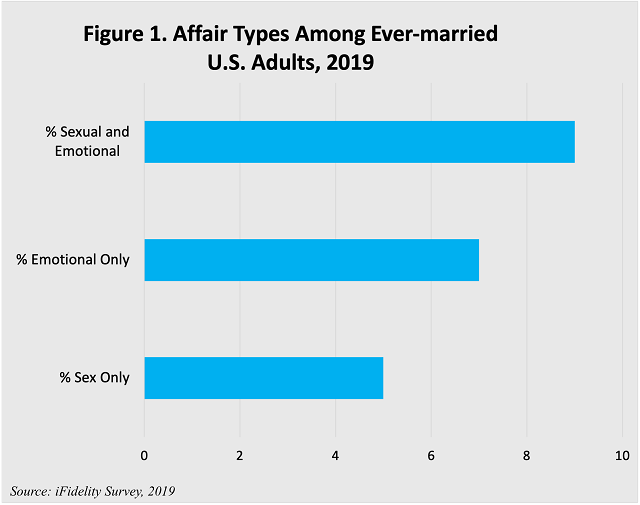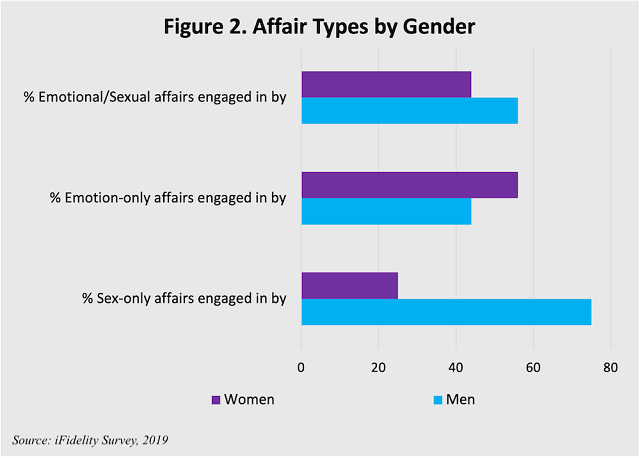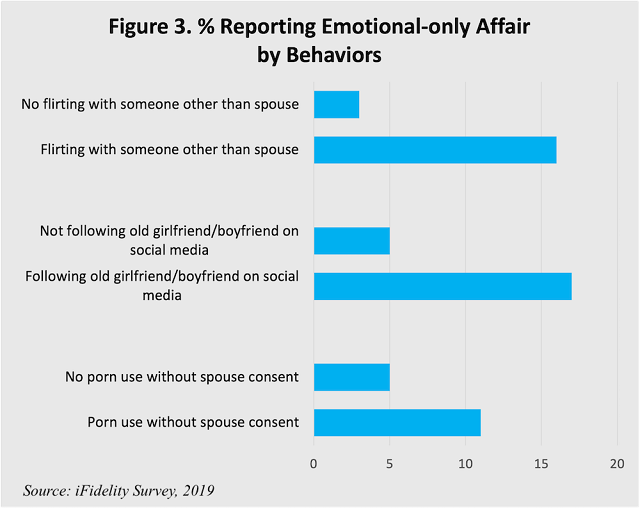Highlights
- In a national sample of 2,000 U.S. adults, 76% felt that a married person having a secret emotional relationship in real life constituted cheating; 72% said an online secret emotional relationship would also constitute infidelity. Post This
- The only predictors of an emotional affair in the full model were behavioral—using porn, following an old flame online, and flirting with someone other than a spouse. Post This
- Men constituted a larger percent of the sex-only and sex/emotion combined affairs. Post This
If a married person has a secret relationship, is it an affair if it doesn’t involve sex or even any physical contact? If such a relationship involved only emotional intimacy, is it “cheating?” Most Americans say yes. In a national sample of 2,000 U.S. adults,1 76% felt that a married person having a secret emotional relationship in real life constituted a form of infidelity; 72% of the participants asserted that an online secret emotional relationship would also constitute infidelity. Thus, neither sexual desire nor sexual contact are prerequisites for infidelity.
The numbers were even higher among the married individuals in that same sample: 80% felt that a secret emotional relationship in real life was unfaithful, and 76% felt that a secret emotional relationship online would be cheating. Even without sexual engagement, then, most married individuals desired to be the only object of their spouse or partners’ emotional affection.
Although scholars have studied extramarital sexual affairs for decades,2 much less is known about the causes, purposes, and consequences of engaging in intimate emotional relations with someone other than one’s spouse. This study sought to understand the individual, attitudinal, relational, and behavioral issues that are associated with emotional affairs. It complements research on sexual affairs and adds to our knowledge about different types of infidelity in the twenty-first century.
The following analysis is similar to my article on predictors of sexual infidelity. It uses the same data as the previous brief, the iFidelity Survey. The survey research company that collected the iFidelity survey data, YouGov, did so in the last two months of 2019, when 2,000 participants were surveyed. Of these, 1,313 were married or had been previously married, and I used data from these “ever-married” individuals for this brief.3
The Numbers
Given the strong attitudes against emotional infidelity, how many married or formerly married participants of the iFidelity survey reported engaging in one? From the ever-married group of the iFidelity data, Figure 1 shows that 7% of participants reported having a strictly emotional affair. That compares with 5% of participants who reported having an affair that was sexual, and 10% who reported that their affair(s) was sexual and emotional. Not shown in Figure 1 are the 78% of ever-married participants who reported that they had not engaged in either type of cheating while married.

Among those married or formerly married participants who reported having an affair, Figure 2 shows that gender distinguishes the type of affair. Men constituted a larger percent of the sex-only and sex/emotion combined affairs (75% and 56%, respectively). Women reported 56% of the emotional-only affairs.

Predictors of Emotional Affairs
In addition to understanding how often emotional affairs occur, it is also important to understand the factors that are correlated with having an emotional affair. I investigated this question in my final analyses.4
Individual characteristics. I tested four individual characteristics to see whether they were associated with reporting an emotional affair—age, education, gender, and race/ethnicity. Age mattered. The older individuals were, the more likely they were to report having had an emotional affair. Given that age was also positively associated with reporting an affair that was both sexual and emotional in nature, this may simply be an artifact of older participants having had more years in which to have an affair.
Education was also related to reporting an emotional-only affair. Those who dropped out of high school were more likely to report an emotional affair relative to the group of participants who had “some college.” Neither gender nor race/ethnicity in this sample were associated with the likelihood of having an emotional-only affair.
Attitudes. After testing the demographic characteristics, I added three attitudes to the statistical model: participants' personal feelings about the importance of religion, their feelings about divorce, and whether participants felt that an emotional affair was “cheating.” Believing that having a secret emotional relationship is a form of cheating was related to being less likely to report an emotional affair. The other two attitudes did not predict having an emotional-only affair. Furthermore, with these attitudes included in the model, education was no longer related to having an emotional-only affair.
Relationship Quality. The third model added marital satisfaction and marital stability. Reporting high relationship stability was related to being less likely to report an emotional affair. Marital satisfaction was not related.
Behavior. Finally, three behaviors were added to the model—flirting with individuals who are not one’s spouse, viewing pornography (whether online or in print), and following an old flame on social media. I chose these behavioral variables because less than half of the iFidelity participants felt that these actions constituted “infidelity.” In the model, all three behaviors were positively related to reporting an emotional affair.
Additionally, when these behavioral variables were included in the model, all the other variables that were previously statistically significant were no longer related to having an emotional affair. Consequently, despite most participants not considering these three behaviors to be cheating, the behaviors were related to having emotional affairs—which most participants did consider to be cheating.
Figure 3 shows the relationship of emotional affairs given one’s behaviors.

Protecting Your Marriage
Most of the participants in our survey, married or not, believed that having a secret emotional relationship outside of one’s marriage constitutes a form of infidelity. A higher percentage of individuals believed that having sex outside of marriage was cheating compared to those who believed that having an emotional relationship was cheating. However, the fact that 76% felt that secret emotional relationships constituted unfaithfulness suggests that an emotional affair can still greatly harm a marriage.
The only predictors of an emotional affair in the full model were behavioral5—using pornography, following an old flame online, and flirting with someone other than a spouse. This suggests a course of action for married people who want to avoid falling into the trap of an emotional affair. That is, they should avoid behaviors that could lead to emotional infidelity—even if a majority of individuals do not consider such behaviors to be "cheating."6
Jeffrey Dew is a fellow of the National Marriage Project and a former fellow of the Wheatley Institution.
1. The iFidelity Survey was sponsored by the Wheatley Institution at Brigham Young University, the National Marriage Project, and the School of Family Life at Brigham Young University.
2. Fincham and May (2017).
3. The figures and text clarify those analyses which used just the “ever married” participants or the whole sample.
4. In the analysis, I used the ever-married participants from the iFidelity data. I used multinomial and multivariate logistic regressions regarding the likelihood of having a sex-only, emotional-only, or sexual/emotional affair relative to having no affair at all. In this paper, I only address the contrast between those reporting an “emotional only” affair, and those who reported having no affairs.
5. In the full model, identifying as Hispanic was positively associated with reporting an emotional-only affair. This association was not statistically significant in the previous models.
6. In the full iFidelity sample, only 42% of participants felt that flirting was a form of infidelity, 32% felt that following an old girlfriend/boyfriend online was a form of infidelity, and 30% of participants felt that using pornography (without the knowledge and consent of one’s spouse) was a form of infidelity.










